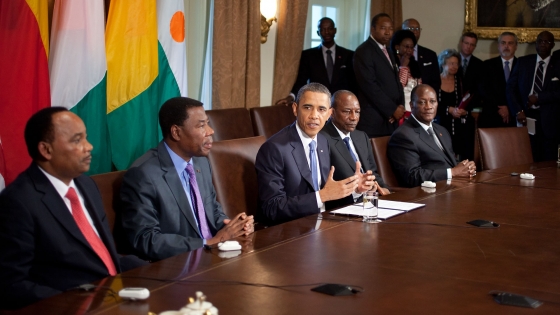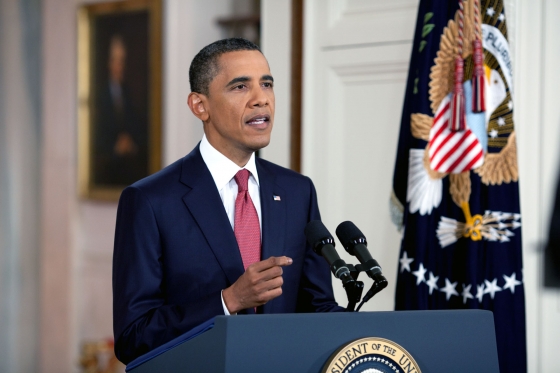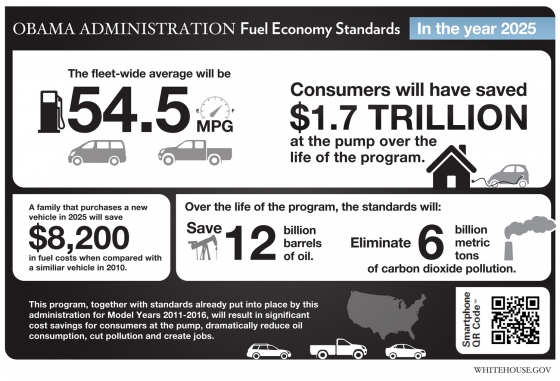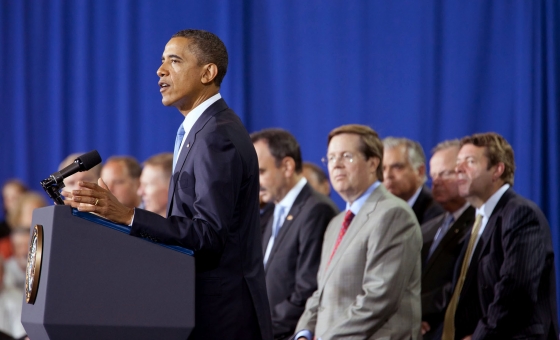-
Tonight, President Obama spoke in support of a bipartisan deal to reduce the nation's deficit and avoid default. It extends the debt limit to 2013, removing the cloud of uncertainty over our economy and ensuring that no one will be able to use the threat of default now or in only a few months for political gain. The bipartisan compromise assures that the United States meets its obligations – including monthly Social Security checks, veterans’ benefits, and the government contracts we’ve signed with thousands of businesses.
In order to receive the support from both parties -- as the President has consistently stressed -- the agreement has a few important elements:
-
A down payment on deficit reduction with historic long-term spending restraint: Nearly $1 trillion in spending cuts -- done in a way to not harm the economic recovery, are balanced between domestic and pentagon spending, and protects critical initiatives like aid for college students;
-
Expedited process for balanced deficit reduction: Puts in place a longer term process for additional $1.5 trillion in deficit reduction through a committee structure that will put everything on the table, including tax and entitlement reform. To prevent either side from using procedural tricks to prevent Congress from acting, the committee’s recommendations will receive fast track authority, which means they can’t be amended or filibustered.
-
Sets the stage for a balanced package, including revenues: The American people and a growing number of Republicans agree that any deficit reduction package must be balanced and included revenue.
-
If the Committee does not succeed in meaningful balanced deficit reduction with revenue-raising tax reform on the most well-off by the end of 2012, the President can use his veto pen to raise nearly $1 trillion from the most well-off by vetoing any extension of the Bush high income tax cuts.
-
-
A proven enforcement mechanism: An enforcement mechanism that will compel painful enough cuts to both sides that it will force congress to act. Enforcement mechanisms by their very nature should include measures that neither side supports so as to ensure action.
-
If Congress fails to act, beginning in 2013 there will be $1.2 trillion in spending cuts through 2021 – 50 percent from domestic spending and 50 percent from defense spending. Low income programs, including Medicaid, and Social Security and Medicare benefits would be exempted. Medicare cuts would be capped, limited to the provider side.
-
- Does not accept entitlement reforms without equal consideration of revenue raising tax reform, and ensures that low-income and middle class families are not forced to bear a disproportionate share of the burden from deficit reduction.
This fact sheet provides and even more comprehensive overview of the deal.
-
-
President Obama urges both Republicans and Democrats to take action to avoid defaulting for the first time in our nation’s history.
-
Today, President Obama welcomed President Yayi of Benin, President Conde of Guinea, President Issoufou of Niger, and President Ouattara of Côte d’Ivoire to the White House. In the President's remarks he spoke about the four leaders' efforts to strengthen democracy in Africa:
All these leaders were elected through free and fair elections. They’ve shown extraordinary persistence in wanting to promote democracy in their countries despite significant risks to their own personal safety and despite enormous challenges, in some cases -- most recently in Côte d’Ivoire -- in actually implementing the results of these elections.
But because of their fortitude and because of the determination of their people to live in democratic, free societies, they have been able to arrive at a position of power that is supported by the legitimate will of their peoples. And as such, they can serve as effective models for the continent.
These countries all underscore what I emphasized when I visited Ghana and gave a speech about Africa as a whole -- this is a moment of great opportunity and significant progress in Africa. Politically, the majority of Sub-Saharan African countries are now embracing democracy. Economically, Africa is one of the fastest-growing regions in the world.
And we just had a very productive discussion where we discussed how we can build on both the political progress, the economic progress, and address the security challenges that can continue to confront Africa. And I emphasized that the United States has been and will continue to be a stalwart partner with them in this process of democratization and development.
-
Senior administration officials have been holding Office Hours all week to answer your questions on the ongoing deficit debate. This afternoon, Deputy Director of the National Economic Council Brian Deese answered questions on unemployment insurance, working through the weekend, FAA funding, and more. See the full conversation below, or on Storify.
Why don't you join us next week? Check out the Office Hours schedule here and follow @WhiteHouse for all the latest updates.
-
Last week, Gayle Smith, Special Assistant to the President and Senior Director for Development and Democracy for the National Security Staff, participated in a live Twitter interview, answering questions submitted via Twitter and compiled by @ONECampaign.

Gayle Smith, Special Assistant to the President and Senior Director for Development and Democracy, participates in a Twitter Interview with the ONE Campaign. July 22, 2011.There were a lot of great questions, and because we couldn’t get to all of them, Gayle answered a few additional questions as a follow-up to the chat:
-
In September 2009, the President announced that – for the first time in history – the White House would routinely release visitor records. Today, the White House releases visitor records that were generated in April 2011. Today’s release also includes several visitor records generated prior to September 16, 2009 that were requested by members of the public in June 2011 pursuant to the White House voluntary disclosure policy. This release brings the grand total of records that this White House has released to over 1.5 million records. You can view them all in our Disclosures section.
Ed. Note: For more information, check out Ethics.gov.
-
"The time for compromise on behalf of the American people is now," said President Obama during a statement on debt negotiations this morning. On Twitter, people are using the hashtag #compromise in response to his speech. Here @whitehouse, we've been using Twitter all week for our new White House Office Hours series, where senior staff have been answering your questions on the debt debate and the economy in 140 characters or less.
Here are some ways you can stay engaged in the conversation on Twitter:
- Use the hashtag #compromise on Twitter to respond to the President's remarks
- Keep on using the hashtag #WHChat to ask White House staff question during Office Hours
- Retweet or reply to our live tweeting of the President's remarks (below)
-
A quick look at what happened this week on WhiteHouse.gov
Deficit Talks: The President spoke throughout the week on the importance of compromise, telling Congress “it’s important for everybody to step up and show the leadership that the American people expect.” He encouraged the American people to make their voices heard during his Monday address to the nation. Many Americans are wondering how the country is spending $12.7 trillion this year, so we created an infographic that details the impact policies and programs implemented over the last 10 years are having on our nation's bottom line.
White House Office Hours: We've been trying something new on our social networks: Senior administration officials have been holding "Office Hours" to answer questions on the ongoing deficit debate. We've been using the hashtag #WHChat on Twitter, where White House staff have been responding in real-time (using only 140 characters per answer) during Office Hours. Why don't you join us next week?
-
July 29, 2011
02:58 PM EDTWe’ve seen switchboards and websites overwhelmed by Americans urging members of Congress to compromise on the debt ceiling, and this morning, the President urged the American people to keep the pressure on, because the price of partisan divergence and defaulting for the first time in our nation’s history is much too high.
Governors, mayors and other state elected officials are joining the growing chorus urging Congress to compromise on behalf of the American people and to remove the cloud of uncertainty that currently hangs over our economy. Democrats and Republicans agree on the problem, and the scope of the solution, and now our state and local leaders are urging Congress to do their job before August 2.
Here is a sampling of what state and local officials are saying in letters to their congressional delegations, op-eds, and statements in support of compromise:
Scott Smith, Mayor of Mesa, AZ:
"We've settled into a normalcy and we've worked to get through this crisis… And we're really a little bit tired that you guys at Washington and the state capitols can't get over the politics, and that the decisions or non-decisions that you make have a direct impact on our citizens… That's not good. It's bad." [East Valley Tribune, 7/27/2011]
-
Immediately after President Obama delivered remarks on the status of the debt ceiling negotiations, Jason Furman, Principal Deputy Director of the National Economic Council, kicked off another session of Office Hours to answer your questions on Twitter. During Office Hours, Furman covered a range of issues, from extending unemployment insurance to the urgency of #compromise, in 140 characters or less.
See a recap of the Twitter Q&A below, or over on Storify. Take a look at our full schedule (including past Office Hours installments), and follow @WhiteHouse for more chances to engage.
-
July 29, 2011
12:50 PM EDTWelcome to the West Wing Week, your guide to everything that's happening at 1600 Pennsylvania Ave. This week, the President was inspired by students at a town hall, met with the Prime Minister of New Zealand, honored the World Series champs, spoke to Hispanic community advocates and addressed the nation on the importance of compromising on a balanced approach to reduce the deficit (infographic). Plus, senior White House advisors answered questions on the ongoing deficit negotiations via live "office hours" on Twitter. That's July 22nd to July 28th or "Mutual Disposition"
-
This morning, President Obama spoke on the status of the debt ceiling negotiations from the Diplomatic Reception Room at the White House. The President urged Republicans and Democrats in Congress to find a bipartisan solution to avoid default that he can sign by Tuesday. Though we are almost out of time, the President made it clear that there are multiple ways to resolve this problem:
Now, keep in mind, this is not a situation where the two parties are miles apart. We’re in rough agreement about how much spending can be cut responsibly as a first step toward reducing our deficit. We agree on a process where the next step is a debate in the coming months on tax reform and entitlement reform –- and I’m ready and willing to have that debate. And if we need to put in place some kind of enforcement mechanism to hold us all accountable for making these reforms, I’ll support that too if it’s done in a smart and balanced way.
-
President Obama today announced the next phase in the Administration’s program to increase fuel efficiency and reduce greenhouse gas pollution for all new cars and trucks sold in the United States. These new standards will cover cars and light trucks for Model Years 2017-2025, requiring performance equivalent to 54.5 mpg in 2025 while reducing greenhouse gas emissions to 163 grams per mile.
-
Today’s report shows that the economy posted the eighth straight quarter of positive growth, as real GDP (the total amount of goods and services produced in the country) grew, but at only a 1.3 percent annual rate in the second quarter of this year. The downward revision in the first quarter to 0.4 percent further reflects the slowdown of economic growth due to substantial headwinds faced in the first half of this year. Additionally, the annual revision to GDP showed that the Great Recession – the worst on record – was even deeper than originally estimated.
We are at a fragile moment in the world economy and cannot afford to do anything to undermine our recovery at a moment such as this. The unemployment rate is unacceptably high and faster growth is needed to replace the jobs lost in the downturn. This report underscores the need for bipartisan action to help the private sector and the economy grow – such as measures to extend the payroll tax cut and unemployment insurance, pass the pending free trade agreements with re-employment assistance for displaced workers, and create an infrastructure bank to help put Americans back to work. It also underscores the need to end the uncertainty surrounding the risk of default and put in place a balanced approach to deficit reduction that phases in budget cuts, instills confidence, and allows us to live within our means without shortchanging future growth.
Notable contributions to real GDP growth in the second quarter included net exports (0.6 percentage points) and fixed investment (0.7 p.p.). Defense spending added 0.4 p.p. to GDP, but this gain was offset by declines in state and local government (-0.4 p.p.) and nondefense spending (-0.2 p.p.). Consumer spending rose just 0.1 percent at an annual rate, with a steep decline (23 percent) in motor vehicle consumption accounting for the weakness. The downward revision to first quarter GDP from 1.9 percent to 0.4 percent reflects lower contributions from inventory investment and imports.
In this year’s annual GDP revision, the overall downward revision was concentrated at the end of 2008 and the beginning of 2009, so that growth in 2008:Q4 was revised to -8.9 percent from -6.8 percent and 2009:Q1 was revised to -6.7 percent from -4.9 percent. What was already the deepest reported recession since official quarterly estimates began in 1947 is now reported to have been significantly worse.
Austan Goolsbee is Chairman of the Council of Economic Advisers
-
Continuing White House Office Hours, Brian Deese, Deputy Director of the National Economic Council, answered your questions on Twitter. Have a look at the Q&A on the ongoing debt debate below or on Storify.
There are two more sessions of White House Office Hours tomorrow -- check out the full schedule at WhiteHouse.gov/officehours and follow @WhiteHouse for the latest updates.
-
July 28, 2011
04:53 PM EDTEd. Note: Cross-posted from the USDA blog.
This week, I led a meeting in the Roosevelt Room at the White House with leaders of a host of rural organizations to discuss the White House Rural Council. The White House Rural Council, which was established by President Obama on June 9, 2011, will build on this Administration’s unprecedented efforts to spur job creation and economic growth in rural America. Along with Jon Carson, the Director of the Office of Public Engagement and Doug McKalip of the White House Domestic Policy Council, we discussed the Council’s efforts to improve coordination among federal agencies. We focused in on ways to help better leverage existing federal resources in rural America – and on how to facilitate private-public partnerships that can move the needle in building stronger rural communities.
The meeting was a chance for me to listen to our rural partners on the issues that need to be addressed and discuss potential solutions. Some of the key issues raised included the need to coordinate more with our federal partners on health care, broadband, and other critical infrastructure; how to increase the availability of capital and lending to rural businesses and families; efforts to remove barriers to young and beginning farmers; and strategies for establishing better partnerships with states, tribes, local governments and the private sector. Many of the leaders gathered also expressed appreciation for the renewed focus on rural America and the importance the White House has placed on these issues.
-
July 28, 2011
03:15 PM EDTToday, I was proud to announce that we are making $95 million available in Regional and Community Challenge grants to support local efforts to build more livable and sustainable communities that ensure that all Americans can afford to live in places with access to employment, schools and public transit options.
But that’s not all these efforts represent. They show that President Obama recognizes that in world where flexible workplaces win, where flexible minds win and where flexible economies win, communities need a flexible federal partner that’s responsive to local needs.
With this funding, we’re building on the $170 million in grants we awarded last fall with our partners from the Department of Transportation to offer a different kind of partnership to local communities. Rather than the “one-size-fits-all” rules and regulations that too often ignored the unique needs of every community and created barriers to growth, the Partnership for Sustainable Communities is helping drive innovation at the local level and leveraging the public, private, and philanthropic investment communities need to thrive.
-
Earlier today, Jason Furman, Principal Deputy Director of the National Economic Council, answered your questions on the debt debate and its impact on the economy during White House Office Hours. See a recap of the Twitter Q&A below, or over on Storify.
If you didn't have a chance to join live, Jason will be answering more of your questions tomorrow. Take a look at our full schedule and follow @WhiteHouse for more chances to engage.
-
It is one of the great American stories, repeated countless times over decades. An immigrant to the US, sitting in a lab or a company or even at home, working to start a company that ends up becoming a great American success story.
Some of our greatest companies began exactly this way. And immigrants today have great ideas that can change the world. The question is whether they will develop them in the United States or somewhere else. Our immigration system should be designed to encourage talented people to study in the United States and start companies here. But today, foreign students studying science and engineering at America’s top universities are actually discouraged from using the skills they learn to create American jobs and make our economy more competitive. The end result is that we end up training innovators and entrepreneurs for other countries. That makes no sense. Instead of showing these future entrepreneurs and scientists the door, we should be stapling a green card to their diplomas and providing Startup Visas to those with the best ideas.
Earlier this week, Senator Schumer hosted a Senate Subcommittee hearing on the “Economic Imperative for Enacting Immigration Reform”. A consistent theme among the hearing panelists, which included leaders from Microsoft and Nasdaq, was that reforming our high skill immigration policy is critical to creating American jobs and spurring economic growth.
-
Today, the CMS Office of the Actuary released its report on how much the United States spends on health care now and in the future. The report shows a 3.9 percent growth in health spending in 2010 – an historic low. Overall Medicare cost growth dropped from 7.9 to 4.5 percent between 2009 and 2010. This slow-down occurred at the same time that many seniors with Medicare received cheaper prescription drugs. According to the report, private health spending has and will continue to be low in the next few years. And the report estimates that private benefit spending growth per enrollee will be 3 percent this year, rather than 4.7 percent thanks in part to the Affordable Care Act’s policy that allows young adults to stay on their parent’s plan.
The report concludes that:
Average annual growth in national health spending is expected to be 0.1 percentage point higher (5.8 percent) under current law compared to projected average growth prior to the passage of the Affordable Care Act (5.7 percent) for 2010 through 2020. Simultaneously, by 2020, thirty million Americans are expected to gain health insurance coverage as a result of the Affordable Care Act.
The bottom line from the report is clear: more Americans will get coverage and save money and health expenditure growth will remain virtually the same. But the report doesn’t tell the whole story.
The Affordable Care Act creates changes to the health care system that typically don’t show up on an accounting table. We know these new provisions will save money for the health care system, even if today’s report doesn’t credit these strategies with reducing costs. These provisions include:
- The Administration’s Partnership for Patients: Better Care, Lower Costs, a new private-publicpartnership to achieve two goals: reduce preventable hospital-acquired conditions by 40 percent and reduce hospital readmissions by 20 percent between 2010 and 2013. Over 2,000 hospitals as well as employers, physicians, nurses, and patient advocates have committed to these goals which, over the next ten years, could reduce costs to Medicare by about $50 billion and help put our nation on the path toward a more sustainable health care system.
- Support for voluntary Accountable Care Organizations that make it easier for health care providers to work together to coordinate care for an individual patient across care settings – including doctor’s offices, hospitals, and long-term care facilities. The Affordable Care Act rewards ACOs that lower health care costs while providing high quality care, and could generate as much as $960 million in Medicare savings over three years.
- Bundled payment programs that will reward doctors and hospitals for working together to provide higher quality care to patients rather than bill for each individual procedure or test.
- Demonstrations launched by the new Innovation Center that will build and test models that will save money for both Medicare and the private sector, and then expand the use of the models that work.
- Important investments in programs that save money over the long-term like prevention and wellness programs.
Americans know that these common-sense strategies will reduce health care costs. Preventing disease and illness before it happens can keep people out of the hospital or the doctor’s office in the first place. Making health care more efficient improves the quality of care and saves money. And investing in new innovations can help generate new ideas and new delivery system reforms that reduce costs. Further, these provisions of the law represent ideas that hospitals, doctors, and employers all over America have been putting into practice for years, where they’ve been able to increase the quality of health care and reduce costs.
We are confident that these reforms – in addition to those in the law – will help make our health care system more efficient, provide better health care to millions of Americans, and bring down health care costs for all of us.
Nancy-Ann DeParle is White House Deputy Chief of Staff
Watch all the musical acts





















